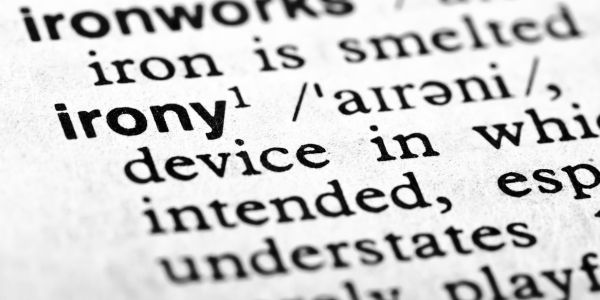“It’s as clear as mud.” Since mud is not clear, the speaker cannot mean what he says. (Let us assume he is male). In fact, he means that what he has heard or read is unclear. Very unclear. He says the opposite of what he means in order to emphasize his difficulty in understanding an explanation. His comment is ironic, as are “as friendly as a rattlesnake” or “about as much fun as a root canal,” neither of which can be said to induce pleasure. The opposite is intended, and surprise is unexpected. That, of course, is the nature of surprise. It is how it is defined.
These examples show irony at its simplest. Irony’s essential characteristic is its oppositional, unexpected nature. If it rains on your wedding day, this is an unfortunate coincidence, perhaps unexpected, but it is not ironic. The event is not the opposite of what was reliably promised. The weather can only be unreliably predicted. A common saying among Russians today is “In Russia, the past is unpredictable.” This perception is profoundly ironic. On the face of it, nothing that is “past” is unpredictable, because the past has passed and it is the future that is unpredictable. But the past can be manipulated by being deliberately recorded inaccurately or dishonestly. Russians, inured to irresponsible, incompetent, deceitful government for centuries, recall all too well the years of Soviet lies and historical revisionism, denials of their government’s mistreatment of its own people, compounded by scandalous whitewashing, re-writing of the past in its official history, to minimize past evil or make the perpetrators of Stalinist evil look good. Thus, as George Orwell demonstrated in 1984, evil becomes “good,” and freedom, “slavery.” The Communist Chinese government has notoriously performed the same deception for years, and the Liberal government of our own country is doing the same thing by effectively falsifying or erasing the past here, by permitting radical activists to destroy statues of celebrated Canadian public figures with impunity, and by re-naming roads that in its profoundly mistaken view “celebrate colonialism.”
The word ‘irony’ derives from the Greek eironeia or ‘simulated ignorance.’ Something in the speaker or writer’s tone, or in the context of the statement or circumstance alerts the attentive hearer or reader to the fact that the utterance is not to be taken at face value. When the intended meaning is grasped, sometimes instantly, as in the first three examples above, a state of ‘secret intimacy’ is said to exist between the initial speaker and its recipient, the listener or reader. The greater the degree of intimacy, the greater the delight in penetrating the apparent meaning to understand what is intended. Here are some more examples, from history and literature, all of which are examples of irony:





